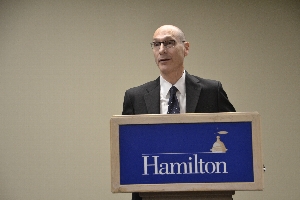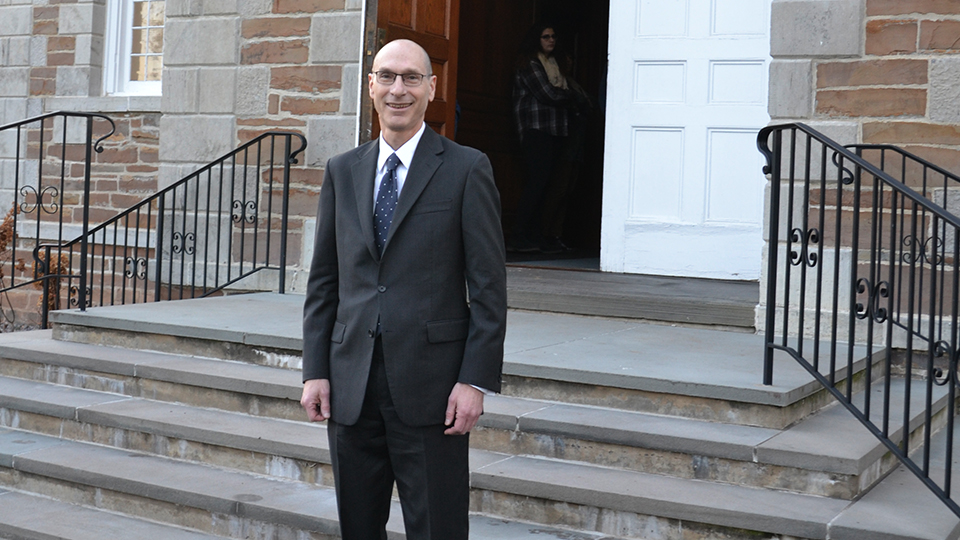News
David Wippman to be Hamilton College’s 20th president
By Kaitlin McCabe '16
December 11, 2015
During last week’s Leadership of 1812 meeting in New York, Hamilton College’s Board of Trustees voted to approve the Search Committee’s recommendation of David Wippman for Hamilton’s 20th president.
“David Wippman's strengths—rigorous scholarship, intellectual curiosity, and creative leadership—are the attributes Hamilton seeks and cultivates in its students. I was inspired by his quick wit and track record of success at diverse and impressive institutions,” said Linda E. Johnson ’80, charter trustee. “As an alum, trustee and search committee member, I am confident that David will both build upon President Stewart’s strong legacy and will continue to expand and realize the ambitions we share for the College.”

The selection was officially announced to the College community in the Chapel on Friday, December 11 in a live-streamed event. The College community encouraged students, faculty and administrators to reserve this time so that every member could participate in the news and welcome the future president to the Hill.
President Joan Hinde Stewart announced her intention to retire on June 30, 2016 during last fall’s quarterly meeting of the Board. Having held her position for 13 years, Stewart will be the eighth longest serving—and first female—president in the College’s 200-year history.
In February, the College announced the members of the official Search Committee that would recommend the institution’s next president to the Board of Trustees. The Board’s chairman Steve Sadove ’73 said in a note to the campus community that he and Charter Trustee Bob Delaney Jr. ’79 would chair this exclusive group, which was comprised of 18 trustees, professors, administrators and current students representing different constituencies of the College.
The Search Committee worked with the national executive search firm Isaacson, Miller to find qualified candidates to fill the position of Hamilton College president. Based in Boston, Isaacson-Miller has extensive experience recruiting leaders in “endeavors that advance the public good,” according to its website, such as education, healthcare, philanthropy and advocacy. The firm also has a rich record of diversity: 42 percent of its hires have been women, and 23 percent have been persons of color. The firm maintains that its “knowledge management system…goes well beyond names to capture a nuanced understanding of leaders and organizations.”
The Presidential Search Committee, which created a website to keep the College community updated with its process, searched for and judged candidates based upon Hamilton’s set goal: that “the College seeks a president who can skillfully navigate this new terrain while embracing Hamilton’s ethos, building on its accomplishments, and offering an even greater promise to the next generation of Hamilton faculty, staff, and students… a bold, visionary president whose intellect and experience will inspire confidence in the Hamilton community.” The committee accordingly determined particular challenges and opportunities to which a strong candidate would need to respond appropriately and effectively, as well as in the true fashion of Hamilton College. Its list of qualifications included: Lead the Hamilton community in creating a bold vision for the future; Maintain a sustainable financial model; Build on the strength of Hamilton’s exceptional liberal arts environment; Support and encourage faculty in an era of renewal; Deepen the campus culture and commitment to diversity and inclusion; Ensure a vibrant and safe campus life; Increase Hamilton’s visibility and engagement beyond the campus.
An extensive list of ideal qualities and characteristics the Committee sought in presidential candidates can be found on the group’s website.
David Wippman comes to Hamilton after serving as Dean of the Law School, which he became on July 1, 2008, and William S. Pattee Professor of Law at the University of Minnesota. He received his B.A. from Princeton University in 1976, from which he graduated summa cum laude, his M.A. through a fellowship in the graduate Program in English Literature at Yale University in 1978, and his J.D. from Yale Law School in 1982.
During his years at Yale, Wippman was the editor in chief of the Yale Law Journal and clerked for The Honorable Wilfred Feinberg, Chief Judge of the U.S. Court of Appeals for the Second Circuit.
Wippman began his career practicing law for nine years in Washington, D.C. with a focus on international arbitration, political consulting on public and private international law issues and representation of developing countries in litigation.
Prior to teaching at UMN, he was a professor and Associate Dean at Cornell Law School and served as Vice Provost for International Relations and Cornell University. However, Wippman notably took a year away from Cornell in 1998-99 in order to serve as a director of the National Security Council’s Office of Multilateral and Humanitarian Affairs, where he worked on various war crimes issues, the International Criminal Court, economic sanctions and U.N. political issues.
An acclaimed expert in international law, Wippman has experience teaching public international law, international criminal law, international human rights, and ethnic conflict. He has co-authored two books on international law: International Law, Norms, Actors, Process: A Problem-Oriented Approach (3rd ed., 2010) and Can Might Make Rights? Building the Rule of Law After Military Interventions (2006).
Indisputably, Stewart’s presidency created a lasting legacy on the Hill to which no other can easily be compared. In her tenure, the College has added new academic programs and hired exceptional new faculty members; invested nearly $250 million the construction and renovation of various facilities for the sciences, social sciences, studio and performing arts, student activities, and fitness and recreation; and set records for student quality, selectivity and diversity. Yet, perhaps Stewart’s most significant contribution to Hamilton has been her dedication to ensuring that qualified students from families of modest means have the financial resources to attend Hamilton through a unique need-blind admission policy.
Whereas Stewart took leadership of Hamilton in a time of growth, Wippman enters during a period in need of great community understanding, compassion and conversation. The incoming president’s qualifications certainly speak for him as a tremendously knowledgeable and experienced leader—with a background in rights and diversity—time can only tell what legacy he will bring to the Hill. Wippman, aware of recent controversies on campus, expressed confidence in his abilities to apply his background in law to the debate of cultural diversity and inclusion, but he understands that leading a law school is far different than leading a liberal arts college. His first priority, he said, is building a stronger relationship with the Hamilton community and the College itself.
“I have a lot of learning to do, “ the President-Elect admitted with a smile, “and I’m looking forward to it.”





